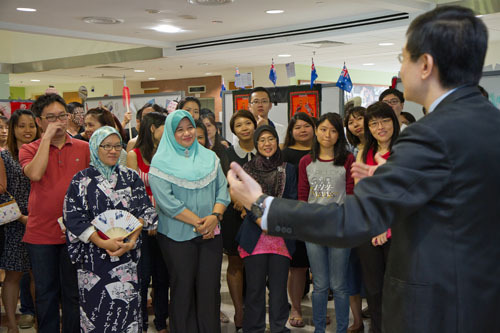
国际学生评估计划 (PISA) 是每3年考试 15 世界各地岁在读, math and science. In the recent 2012 测试, 65 国家和教育系统参加: http://www.oecd.org/pisa/keyfindings/PISA-2012-results-snapshot-Volume-I-ENG.pdf. 尽管美国并没有表现良好, 令人印象深刻的PISA涨幅低执行国家提出, 例如卡塔尔和哈萨克斯坦. 有些性能更高的国家, 如新加坡, 波兰, 德国和意大利, also made significant advances. PISA results are often used by governments around the world to justify decisions they wish to take on education policy. But should PISA be allowed to become the conclusive world exam for our kids? 今天 全球搜索教育, 我也问过白T恤伍, 托尼·瓦格纳和兰迪万家顿,分享他们的观点.
何. 白T恤的吴副院长, 领导力学习, 办公室研究生学习和专业学习,在国立教育研究院, 新加坡南洋理工大学, 新加坡共和国. 何. Tony Wagner is Expert in Residence at Harvard University’s Innovation Lab. Randi Weingarten is President of the American Federation of Teachers.
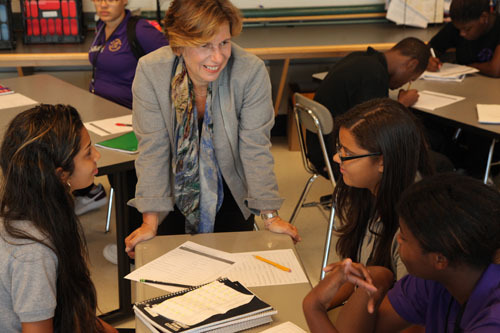
The PISA results provide some useful information about education systems. 然而, many subjects are not tested by PISA. How much credit should individual countries give to the PISA results as an accurate country by country comparison of student outcomes in Math, 科学与阅读?
托尼·瓦格纳: 不像其他的检查,如NAEP TIMSS或, PISA测试的学生’ 能够运用所学 — 运用知识的新情况, 不只是记得它. 因此,我认为是透露,在测试的大趋势是需要考虑的很重要的. 这一事实后 11 年不让一个孩子掉队, 美国显示任何PISA无进展 — 而其他许多国家都取得了长足的进步 — 也许是最显著的发现,我们. 它告诉我们,我们使用了错误的策略,以提高教育.
吴PAK: PISA是对数学的几个公认的国际比较的工具之一, 科学和读取性能. 由于全球化, 教育标杆与他人提供的国家的指示 (没有绝对的衡量) of its current and future competitiveness in the global market. 所以,, PISA调查结果都在以自己的方式有用. 然而, PISA is not everything. It does not paint the entire picture. It does not test social skills or emotional maturity, or measure appreciation of sports and arts. Some have questioned the validity and reliability of the PISA tests, 以及是否某些司法管辖区“被骗’ on them. 但, international comparisons in education standards can never be absolutely fair. 各国必须自问的更重要的问题是他们为什么彼此之间以及他们与结果做比较,以提高他们的孩子的教育. 各国应采取PISA结果作为一个有用的参考, 不作为的成绩单.
兰迪•万家顿: 从未有一个完美的措施, 特别是考虑到大型国际变性. 话虽这么说,, PISA has a lot of good information. Countries (包括美国) 应该使用PISA结果连同其他信息,以告知我们改善我们学校的路上. 我们不能继续仅仅看赛马,并感叹说,美国仍然表现不佳,继续前进,直到下一次PISA报告. 这是义不容辞的所有决策者与教育工作, 父母和其他利益相关者实际学习表现最出色的国家的经验教训,做我们知道将努力使学校更公平,更成功.
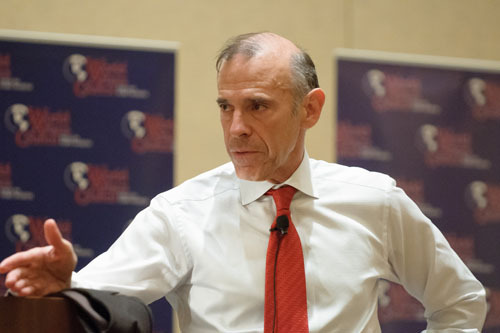
Successful education systems globally are working to create alternative pathways (例如. 专业) instead of just academic ones for students to find success. 你有什么想法在这?
托尼·瓦格纳: Many of the most successful education systems — 尤其是芬兰 — 提供职业/技术途径为学生. 在该国, 近一半的学生选择CTE (职业技术教育) over an academic curriculum. My research suggests that as many as half of the high school students in the US would also choose a high quality CTE curriculum if it were offered. With the un and under employment rate of recent college graduates now over 50% 和大学的费用继续攀升, 越来越多的学生都担心,四年的大学教育未必是明智的投资,它曾经是. 我的一个关于共同核心最大的担忧是,它似乎只提供一个放之四海而皆准大学预科课程所有学生.
兰迪•万家顿: 这是我们国家非常重要. 我们必须为我们的学生提供全面支持, 多音轨. 美国教师联合会倡导高品质的CTE机会年,我们应该看看那些成功地将这些方案的国家, 如新加坡, 德国, 和那些在北欧.
我参观了CTE学院在新加坡, which was impressive. They have the same emphasis on CTE as they do on traditional academic study. It was a well-funded, highly productive school that prepared students to immediately move into the Singaporean economy and have a successful career in hundreds of exciting areas.
Here in the U.S. we need to look at more collaborative efforts between school districts, businesses and higher education. When done well, high-quality career and technical education provides graduates with employment in good-paying 21st-century jobs, establishes a solid foundation for further education, and makes a vital connection for students between their high school educations and a tangible, desirable future. These programs have been found to lower drop-out rates and give students a defined pathway to a productive life doing meaningful work.
吴PAK: A good education system provides a platform for different talents to flourish and different aspirations to be fulfilled. It helps students, with different needs, inclinations and strengths, find success in their areas of study, be those in arts, sports or technical education. It encourages each student to find identity, 意思, and purpose through their school lives. 所以,, I support the drive for education systems globally to develop many pathways for students to find success in their different areas.
在新加坡, we take a balanced approach. Students who can do well academically are given opportunities to develop their academic potential. But we also commit vast resources to level up every student and create more pathways for students to find success in their areas of strength. We try to educate our students so that they will contribute to society when they are successful.
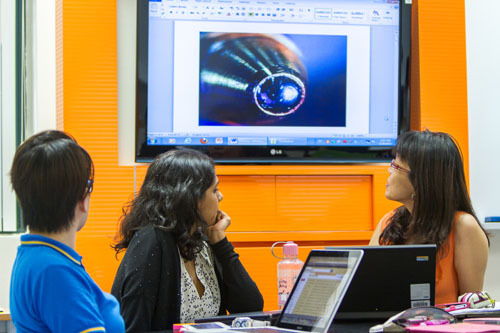
School systems globally can learn from each other’s practices, but given the unique cultural and developmental trajectories of individual countries, how easy or difficult is it to copy practices?
托尼·瓦格纳: Countries cannot necessarily “copy” practices of other countries, but we can learn a great deal from trends that we see elsewhere. 例如, other countries like Sweden that have invested heavily in school choice have seen their scores decline sharply. While countries that have made significant investments in radically improving their teacher preparation programs have seen dramatically improved PISA scores.
吴PAK: The strengths of other systems should inspire us to reflect on our own system. But we cannot copy practices. We have to understand the underlying principle behind the success of others and find our own way to success, based on our unique culture and contexts. Finland and Singapore have been used often as examples of educational success. 在芬兰, all their teachers have a master’s degree. I do not think any education system can demand that of their teachers overnight! 在新加坡, we have a national system for recruiting new teachers, training in-service teachers and developing school leaders. But one cannot take this idea and simply implement it in a decentralized system. The important lesson is to appreciate the underlying principle of having good teachers and school leaders, and taking their continuous professional development very seriously.
兰迪•万家顿: Of course culture matters but there are clear lessons that cut across all cultures. 第一, teaching matters. We must build a profession of teaching that treats teachers as the educational experts they are. We must give our teachers the time, 工具, and support they need to succeed. Schools must assure that teachers have a say in the decisions that affect their classrooms. 最重要的是, teachers need time to collaborate with colleagues, time to prepare their lessons so they are the best teachers they can be. We need to stop the top-down accountability that has silenced innovation and build a more horizontal structure in schools where teachers work together and are accountable to each other instead of to a test score.
安德烈亚斯·施莱歇 (Deputy Director for Education and Skills, OECD Special Advisor on Education Policy) has said time and again, “an inequitable school system can never be a high-performing school system.” This concept transcends culture. All the high performing systems take active steps to address equity in schools. This is a lesson the U.S. must learn as soon as possible. PISA study after PISA study has shown the high level of inequity in our schools. 中美. schools mainly rely on property taxes for funding, which means poor areas receive far less funding than wealthy districts. 因此, those who need the most resources don’t get them.

Photos are courtesy of AFT, Pak Tee Ng and Tony Wagner
在全球寻找教育, 和我一样,全球知名的思想领袖,包括迈克尔·巴伯爵士 (英国), 何. 迈克尔座 (美国), 何. 莱昂特司特因 (美国), 克莱克里斯坦森教授 (美国), 何. 琳达·达林 - 哈蒙德 (美国), 何. 马达夫查万 (印度), 迈克尔·富兰教授 (加拿大), 霍华德·加德纳教授 (美国), 安迪·哈格里夫斯教授 (美国), 伊冯娜赫尔曼教授 (荷兰), 克里斯汀Helstad教授 (挪威), 让·亨德里克森 (美国), 玫瑰Hipkins教授 (新西兰), 科妮莉亚Hoogland教授 (加拿大), 这位杰夫·约翰逊 (加拿大), 太太. 尚塔尔考夫曼 (比利时), 何. Eija Kauppinen (芬兰), 国务秘书塔皮奥Kosunen (芬兰), 多米尼克·拉方丹教授 (比利时), 休·劳德教授 (英国), 本·莱文教授 (加拿大), 主肯麦克唐纳 (英国), 巴里McGaw教授 (澳大利亚), 希夫纳达尔 (印度), Ř教授. 纳塔拉詹 (印度), 何. 吴PAK (新加坡), 何. 丹尼斯教皇 (美国), 斯瑞达拉贾戈帕兰 (印度), 何. 黛安·拉维奇 (美国), 理查德·威尔逊·赖利 (美国), 肯·罗宾逊爵士 (英国), 帕西SAHLBERG教授 (芬兰), 押尾佐藤教授 (日本), 安德烈亚斯·施莱歇 (PISA, 经合组织), 何. 安东尼·塞尔顿 (英国), 何. 大卫·谢弗 (美国), 何. 基尔斯滕都沉浸式 (挪威), 总理斯蒂芬·SPAHN (美国), 伊夫Theze (公立中学法语美国), 查尔斯Ungerleider教授 (加拿大), 托尼·瓦格纳教授 (美国), 大卫·沃森爵士 (英国), 迪伦Wiliam教授 (英国), 何. 马克沃莫尔德 (英国), 西奥Wubbels教授 (荷兰), 迈克尔·杨教授 (英国), 和张民选教授 (中国) 因为他们探索所有国家今天面临的大画面的教育问题. 全球搜索教育社区页面
ç. M. 鲁宾是两个广为传诵的在线系列,她接受了笔者 2011 厄普顿·辛克莱奖, “全球搜索教育” 和 “我们将如何阅读?” 她也是三本畅销书, 其中 真正的爱丽丝梦游仙境.
按照ç. M. 鲁宾在Twitter: www.twitter.com/@cmrubinworld



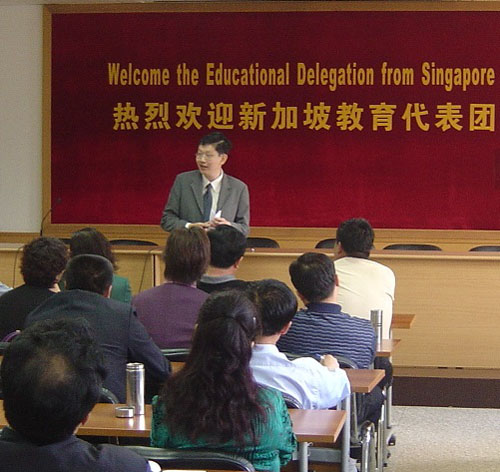
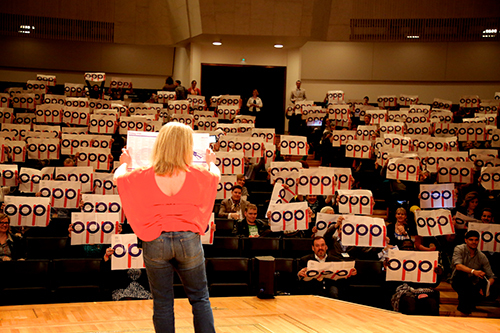
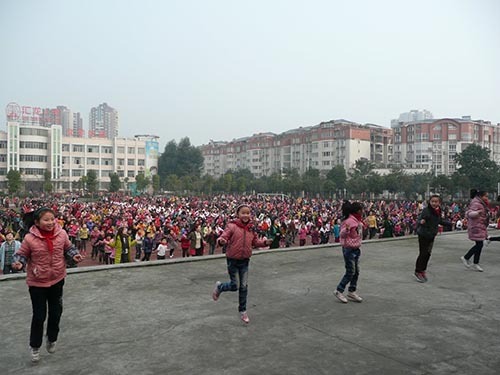
最新评论